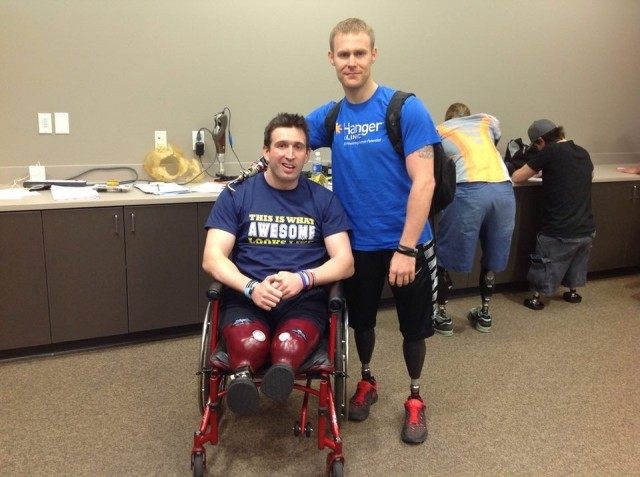His family were told he would never walk or talk again. Now L/Bdr Ben Parkinson MBE has once again defied his doctor’s diagnosis by walking up and down stairs at a training camp for bilateral above knee prosthetic users, in Oklahoma, USA.
The soldier, who was thrown from his vehicle when it ran over a mine in Afghanistan 2006, lost both his legs, broke his back, hips and ribs ande suffered brain damage. He lay unconscious in a military hospital for three months, when his family received the awful diagnosis.
But defying the odds, thanks mainly to his utter determination and support of his family, friends and his beloved charity, the Pilgrim Bandits, Ben is now not only walking around two miles a day and is starting to regain control and use of his left arm. His speech is also clearer and tiny bits of shrapnel which have been embedded since 2006 are starting to emerge from his body.
He has also felt his nerves in his upper legs starting to tingle, meaning he is now able to move his hips himself and walk on his prosthetic legs without crutches.
In a post on their facebook page, the charity wrote:
“Astounding news from USA. After only one and a half days at Hangar Ben is walking unaccompanied in the mall, walking up ramps, and unbelievably climbing stairs. His family are blown away by the results and want to thank all our supporters who are making this possible.”
Such was Ben’s eagerness, he even tried to take the stairs two at once.
The dramatic improvement over the last few months has been put down to the Hyperbaric Oxygen Therapy (HBOT) treatment he received at Castle Crag hospital in Scotland back in February.
“It’s taken four years of hard work to get Ben and the others we work with to this sort of stage in recovery” a spokesman from Pilgrim Bandits said. “The HBOT treatment has helped enormously and if you take it that Ben was reputed to be the most injured to survive it stands to reason that this treatment would and could help others.”
His determined mother, who has never once stopped fighting for her son after he had been written off, said, “I don’t know whether to laugh or cry at the moment. Less than two days at Hangar and Ben is climbing stairs.”
She added, “Andy (Ben’s stepfather) has learnt more in 12 hours than in the last eight years. The way forward is now so clear, and we now know how to capitalise on the HBOT gains.
“The tears are for the lost years, and the knowledge that without the charity Ben would never have had this chance. All our wounded should get the very best, not be written off according to the lowest cost estimate.”
A Freedom of Information Request to the Ministry of Defence by Breitbart London asked why the treatment was not being used more widely, despite the success it has had and the cost effectiveness compared to the medication and other therapies injured soldiers and those with brain injuries suffered.
In a reply from the Headquarters of the General Surgeon, we were told:
‘The MOD uses hyperbaric oxygen therapy (HBOT) where it is clinically indicated for use in line with national guidelines set by NICE. It is not currently used for the rehabilitation of neurological, complex trauma or musculoskeletal injuries.
‘The techniques MOD employs for the rehabilitation of personnel are continuously reviewed in line with emerging technologies, research, and national guidance. Should a new approach prove successful, it will be considered as part of that review process.
‘LBdr Ben Parkinson has undergone HBOT in a trial offered by the private Castle Craig Hospital in Scotland. While the MOD is unable to comment on an individual patient’s treatment, the MOD can confirm that it did not fund LBdr Parkinson’s HBOT. ‘
Between 7 October 2001 (the start of Operations in Afghanistan) and 31 March 2014 (the latest date for which medical discharges information is available), 970 UK Service personnel have been medically discharged following their injuries in Afghanistan and Iraq. Of these, 696 were injured in Afghanistan and 274 were injured in Iraq.

COMMENTS
Please let us know if you're having issues with commenting.